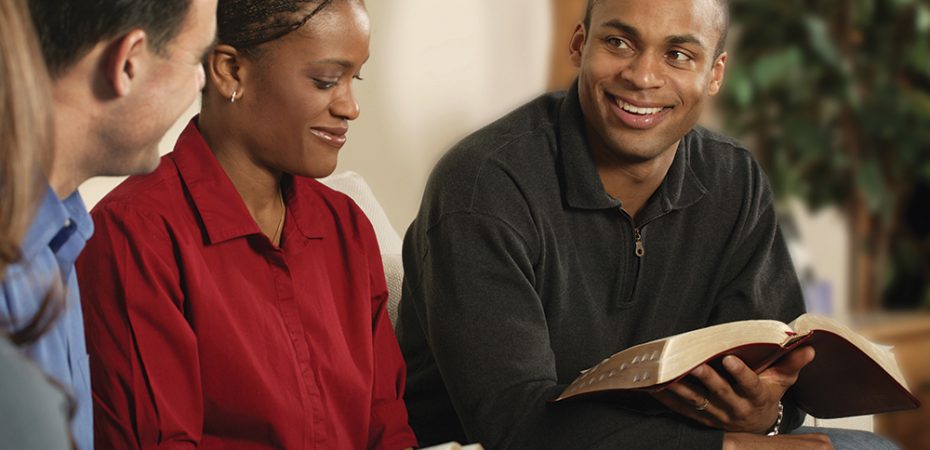Reflective Practices: A Ministry for the Church
Program offers educational support in caring for God’s people
Deacon Denny Nash, Deacon Trey Mobley, Dr. Ryan LaMothe Comments Off on Reflective Practices: A Ministry for the Church
One of the greatest blessings of ministry is the opportunity to enter sacred space with others where their greatest and deepest joys, pains and yearnings are expressed. For the deacon, this is a most sacred trust, a trust that involves respect and care for the vulnerability of others. One of the key skills needed to be faithful to this sacred trust is the ministry of listening.
Naturally, we all listen through the lens of our own experience with our own joys, pains and yearnings. One of the strengths of the diaconate is that we bring life experience different from the presbyterate and often more similar to parishioners. These experiences are possible opportunities for God’s wisdom and grace to connect with and minister to others.
Other times, our past experiences can be impediments when they lead us to misinterpret key details or when we react out of our own fears or hurts. What opportunities do deacons have to reflect on their experiences in ministry, to discern when they are reading the situation well or when their actions are not pastorally effective? How do deacons continue to grow in their ability to truly hear the other and to recognize God in the encounter?
Educational Support
Once ordained, clergy, for a variety of reasons, lack the support and opportunity for consistent reflection on their experiences of ministry. Recognizing this, between 2002 and 2004, Saint Meinrad Seminary and School of Theology developed a program for a Certificate in Reflective Practices in Pastoral Care.
This program entails training experienced ministers in the art of reflective practice, which we believe is an important ministry for the Church. Various pastoral documents speak to the importance of this ministry, such as the USCCB’s “A Family Perspective in Church and Society”; the recent document on priestly formation; and The National Directory for the Formation, Ministry, and Life of Permanent Deacons in the United States.
Indeed, since all ministers have the sacred privilege of caring for people in moments of vulnerability, we believe there is a moral, categorical imperative that all ministers earnestly engage in lifelong learning. This program was developed in consideration of this imperative — to aid deacons in caring for all God’s people.
Reflective Practice
Reflective practice is a process of facilitating ministers’ reflections on their ministerial experiences and actions, like the supervision people receive in Clinical Pastoral Education (CPE). But it is meant to be a continual practice, a way to engage in lifelong learning and seek excellence in ministry.

An underlying theological premise for reflective practice is grace building on nature. By this, we mean that a deacon’s ministry necessarily involves his complex subjectivity. Making use of this subjectivity for the sake of helping others requires the discipline of self-awareness. This understanding is critical to human formation, which is the foundation of the intellectual, pastoral and spiritual dimensions of formation.
The National Directory for the Formation, Ministry, and Life of Permanent Deacons in the United States says: “Formation for ministry begins with human formation and development. Participants ‘should therefore cultivate a series of human qualities, not only out of proper and due growth and realization of self, but also with a view to the ministry’” (No. 106).
Being self-aware is especially important when serving those who are vulnerable or different from ourselves, which includes those that deacons are particularly ordained to serve, like the poor and the marginalized. Reflective practice is a process of grace wherein deacons deepen and broaden their self-awareness, discerning how to make use of the self to incarnate God’s love.
Saint Meinrad’s Certificate in Reflective Practices has been offered to lay and clergy alike for the past 16 years. During this time, news of the program spread, largely through people who completed the certificate and sought to introduce this ministry into their dioceses and parishes. The program piqued the interest of Catholic physicians and nurses who believed reflective practice would be helpful in facilitating professional growth in their own healing ministry.
There has also been interest from clergy outside the United States. After earning the certificate, Father Michael de Stoop, from the Archdiocese of Sydney, developed a reflective practice program for the Diocese of Sydney that involves all ministers — lay and ordained.
Model Program
Closer to home, Deacon Denny Nash, director of the diaconate for the Archdiocese of Louisville, and Deacon Trey Mobley, the associate director of formation in the same diocese, found completing the certificate process enormously helpful, not only in their ministry as deacons but in their personal lives and relationships as well.
Realizing the benefit of reflective practice for those both in formation and in active ministry, they introduced the process to men in formation for the diaconate with the expectation that these men would enter reflective practice upon ordination. They understand self-awareness, listening and being present to the other as essential to diaconal ministry, and felt that reflective practice would significantly enhance and improve their skills in these vital areas. And they found that after an introductory experience of the process, the candidates were enthusiastic about the prospect of continuing this learning, where they could explore their ministerial experiences in a safe setting with a trained facilitator.
Opting for a small group model, Deacons Nash and Mobley instituted a program whereby the newly ordained deacons would engage in group reflective practices for a period of two years after ordination. The hope is that in two years they will develop a habit of reflection with its associated skills and continue the practice for as long as they are in ministry.
In the group process, each participant, in turn, has the opportunity: (1) to select and describe a ministerial issue or situation; (2) to analyze/assess the event (raising questions for consideration); (3) to identify new insights and learning. The process allows participants to get in touch with their vulnerability and to explore their subjectivity with others in a healthy and edifying way.
Group confidentiality and the leadership of a skilled facilitator are key elements in carrying out this process. The facilitators of these groups all completed Saint Meinrad’s Certificate in Reflective Practices.
The pandemic offered new opportunities in videoconferencing, which can be an effective tool to give more flexibility in extending this ministry to other venues.
Growth
Ministry is a complex, challenging, vulnerable and demanding undertaking. We believe all ministers would like to grow in their ability and wisdom in ministry. It is a great gift to be able to step into the work of God more fully with one’s whole self. Reflective practice can facilitate this type of growth. We believe it appropriate for all who minister — lay, priest and deacon.
Deacons, as servant leaders typically outside other authority structures, are particularly suited to take up this ministry of reflective practice, both as participants and facilitators. It takes courage and humility to be willing to explore with others how we can personally grow in our ministry. But if we open ourselves, these are the spaces that God most often strengthens us and blesses us richly. Essentially, reflective practice is a ministry to the minister, and that is how it is a ministry to the Church.
The Diaconate Program in the Archdiocese of Louisville is committed to the pursuit of lifelong learning for permanent deacons, whether they are preparing for ordination or engaging in their ministries as deacons. If deacons truly desire excellence in their ministry, it seems imperative to us that they would want to reflect, with others, on how they might minister better.
We understand this task is not easy, that it requires vulnerability, courage and humility. It also requires practice and skills. Saint Meinrad is committed to training ministers in these skills.
For us deacons, who frequently call others to reflect on how they might live their lives better in the light of God’s presence, we see the reflective practice as a gift that enables us to do this better. More importantly, it is a way for us to be an example ourselves and to honor one of the fundamental charisms of diaconal ministry: to practice what we preach.
DEACON DENNY NASH is the director of the diaconate for the Archdiocese of Louisville. DEACON TREY MOBLEY is the associate director of formation for the Archdiocese of Louisville. RYAN LAMOTHE, Ph.D., is a professor of pastoral care and counseling at Saint Meinrad Seminary.
………………………………………………………………………………………………………………………………………………………..
Additional Information
Anyone interested in learning more about the Certificate in Reflective Practices may contact Dr. Agnes Kovacs (akovacs@saintmeinrad.edu) at Saint Meinrad Seminary and School of Theology.
For those interested in knowing more about the Archdiocese of Louisville’s deacon program, contact Deacon Denny Nash (dnash@archlou.org) or Deacon Trey Mobley (tmobley@archlou.org).
…………………………………………………………………………………………………………………………………………………………





